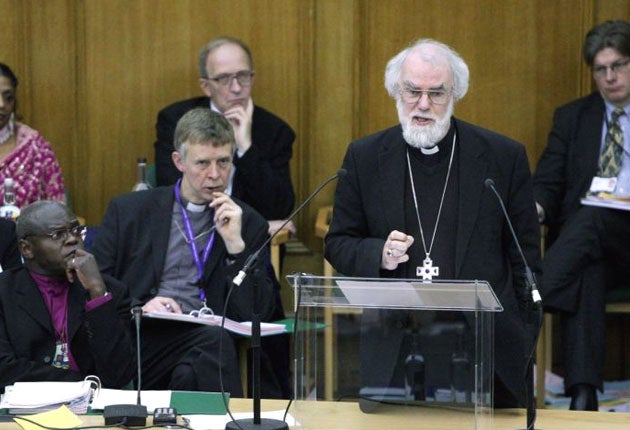Synod votes to ban clergy from joining the BNP

Your support helps us to tell the story
From reproductive rights to climate change to Big Tech, The Independent is on the ground when the story is developing. Whether it's investigating the financials of Elon Musk's pro-Trump PAC or producing our latest documentary, 'The A Word', which shines a light on the American women fighting for reproductive rights, we know how important it is to parse out the facts from the messaging.
At such a critical moment in US history, we need reporters on the ground. Your donation allows us to keep sending journalists to speak to both sides of the story.
The Independent is trusted by Americans across the entire political spectrum. And unlike many other quality news outlets, we choose not to lock Americans out of our reporting and analysis with paywalls. We believe quality journalism should be available to everyone, paid for by those who can afford it.
Your support makes all the difference.The Church of England has voted, in an emotionally charged debate at the General Synod, to ban clergy from becoming members of the BNP.
Anglicans have become increasingly concerned that the British National Party is portraying itself as a mainly Christian organisation. Yesterday's vote represented a clear desire to distance the Church from any far-right nationalist sentiment.
The proposal to ban the BNP was put forward by a lay synod member who works for the police and received backing from the archbishops of Canterbury and York, and the former Metropolitan Police commissioner Sir Ian Blair. The motion does not immediately forbid clergy from becoming members of the BNP but it does ask the House of Bishops to formulate a policy comparable to the one adopted by Britain's police forces which forbids their members from supporting the BNP. The motion would also effect some lay church staff.
Vasantha Gnanadoss, a civilian who works for the Met and the ban's architect, urged synod members to vote in favour of the motion in order to make it "much more difficult" for far-right organisations to portray themselves as ideologically Christian or claim that they had support within the Church.
She said: "If supporting organisations like the BNP is inconsistent with Christian discipleship, it seems obvious that clergy and others who speak for the Church should not be members."
Last year, a list of 12,000 BNP members was leaked on the internet. Five Church of England clergy members were on the list although none was a serving Anglican priest at the time. Others members on the list showed clear Christian affiliations, including bell ringers and cathedral tour guides.
Although previous synods in 2004 and 2007 said racism was incompatible with Christian values, this is the first time that the Church has specifically approved a ban on political membership. Under current guidelines there are no restrictions on members of the clergy or those working for the Church from joining a political party.
If the ban comes into effect, Anglican clergy will join police, prison guards and immigration officers as being one of a few professions where being a member of the BNP is forbidden.
The motion was passed overwhelmingly and without any of the three amendments which would have watered down the ban or removed specific reference to the BNP. When the vote came in, it was revealed that 322 members voted in favour of a ban compared to just 13 against and 20 abstentions.
The motion was also passed despite concerns that it will not be legally enforceable. William Fittal, secretary general to the Synod, has warned that human rights law may make a ban on the BNP impossible to enforce because the party is not politically proscribed. Supporters of the motion managed to argue that a ban should be looked at regardless of its legal enforceability.
Simon Darby, the deputy leader of the BNP, reacted angrily to yesterday's vote and accused the Church of England of being "un-Christian". "It's a witch-hunt," he said. "You can't have an organisation passing itself off as Christian while embarking on thoroughly vindictive and un-Christian behaviour."
Join our commenting forum
Join thought-provoking conversations, follow other Independent readers and see their replies
Comments